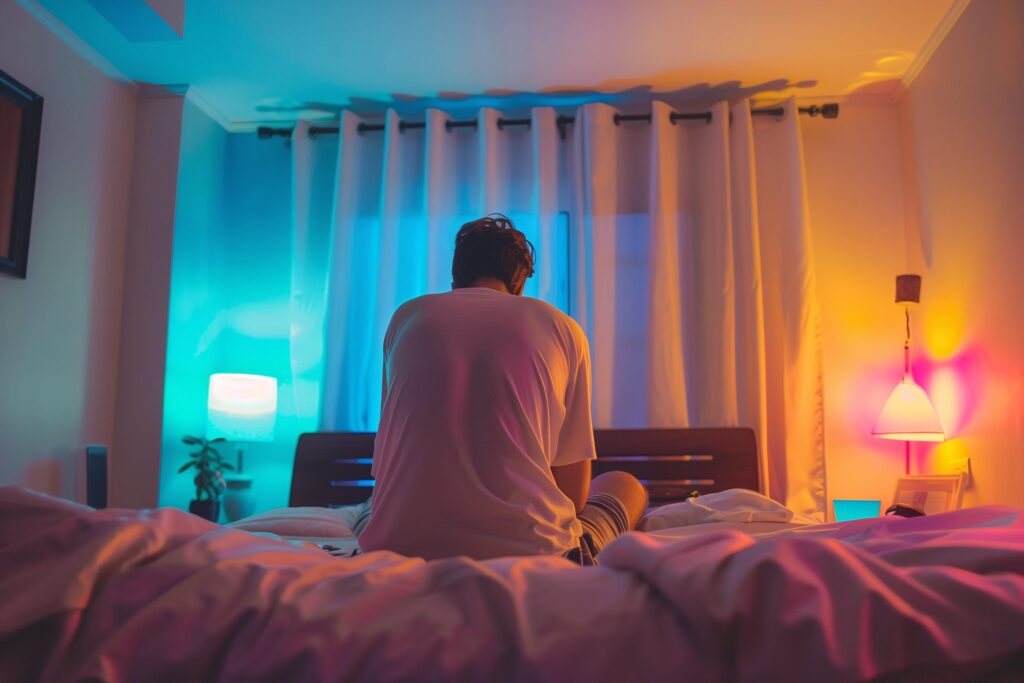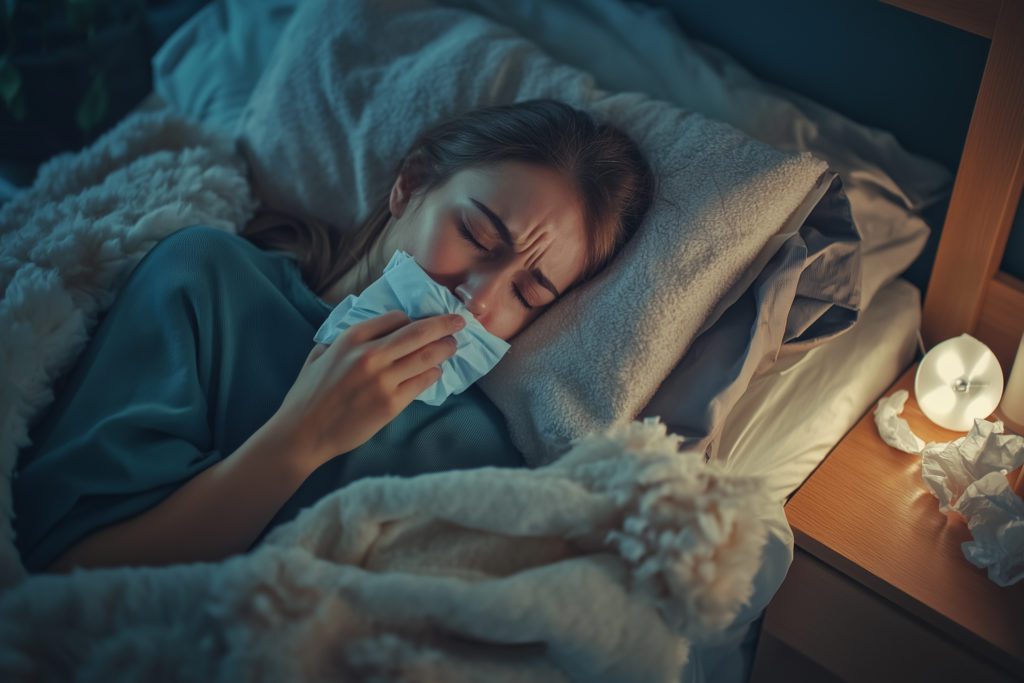
Insomnia: Causes, Symptoms and Treatments
Worried about insomnia? You aren’t alone. Studies have shown that from 20-50% of the population lives with insomnia at some point.

Everyone’s risk for insomnia increases as they get older due to age-related changes to their internal sleep system.
Insomnia is defined as having difficulties falling asleep, staying asleep, or waking up earlier than intended. To officially meet the criteria for insomnia, you must experience sleep issues three times a week that last >30 minutes. People with insomnia also report emotional distress or impaired functioning during the day.
There are two main types of insomnia:
Acute Insomnia (short-term): This type of insomnia can last from one day to several weeks, it is usually temporary and subsides on its own. In some people, acute insomnia can transition into chronic insomnia, especially without intervention.
Chronic Insomnia (long-term): This type of insomnia can plague you for months or even years. To meet criteria for chronic insomnia you must have symptoms of insomnia for three months or more.
What Causes Insomnia?
Medical causes
Around 50% of insomnia cases are due to mental health conditions. The most common mental health conditions that negatively impact sleep include depression, anxiety, post-traumatic stress disorder, and attention deficit hyperactivity disorder. Medical conditions such as chronic pain, digestive issues, breathing disorders, hormonal imbalances, illnesses and infections, nutritional deficiencies and dementia are also common causes.
Environmental Causes
The other main contributor to insomnia is environmental causes such as poor sleep habits, shift work, jet lag, caring for someone else, sleep environment problems, and overuse of stimulants.
Sleep disorders
Sleep disorders like restless leg syndrome, narcolepsy, and sleep apnea may all lead to insomnia. In some cases, when there is no known association between any medical or environmental cause, a person will be diagnosed with primary insomnia.
What are the Symptoms of Insomnia?
Apart from disrupted sleep, insomnia can lead to symptoms such as:
• Daytime sleepiness and fatigue
• Irritability and mood swings
• Tension headaches
• Gastrointestinal symptoms
• Motivation and attention problems
• Memory issues
• Poor appetite regulation and weight gain
• Lack of coordination, leading to errors or accidents
• Increased risk of chronic insomnia
What are the Best Treatments for Insomnia?
The first step in improving insomnia is to treat any underlying cause of insomnia. However, when someone has struggled with their sleep for a long time, there are certain patterns and stress responses that may lead to ongoing sleep problems. Although medication is the most common treatment for insomnia, it isn’t the most effective as it doesn’t treat any underlying problems. There are a variety of non-medical treatments and supplements that can be used to help reduce the symptoms of insomnia and improve your sleep.
Best Non-Medical Treatments for Insomnia
- Cognitive behavioural therapy for Insomnia (CBT-I) (considered to be the most effective treatment for insomnia
- Sleep coaching or counseling
- Establishing sleep habits such as a regular sleep schedule, morning light exposure, mental decompression, limiting digital devices before bed, and leaving the bed when you cannot sleep
- Refraining from doing anything in bed other than sleep and intimate times to strengthen the association between your bed and sleep
- Increased daily activity and exercise
- Dietary changes such as reducing caffeine (4 cups or less before 2 pm) and not eating within 2-3 hours of bedtime
- Avoiding naps or limiting them to 20 minutes before noon
- A sleep mask and pink or white noise machine during the night
Supplements for Insomnia:
- Low doses of melatonin (0.5 mg) (use sparingly and talk to your doctor)
- Natural compounds like chamomile and hops before bed to help induce relaxation
- Magnesium Glycinate: Low magnesium can result in insomnia, restless sleep, frequent waking, and anxiety. Around 50% of people don’t get enough magnesium.
- Vitamin D: Vitamin D deficiency can seriously interrupt sleep. Most studies find that over 40% of us are deficient in the sunshine vitamin.
Insomnia is a common problem that can have serious consequences on a person’s quality of life. If you are struggling with your sleep, try improving your sleep with non-medical interventions and talk to your doctor about any possible underlying issues that may be contributing to your insomnia.
FAQ
Is insomnia linked to genetics?
Insomnia has a genetic component, with heritability ranging from 30% to 40%, varying by sex. A meta-analysis of twin studies highlighted that insomnia is about 40% heritable, with slightly higher heritability in females than males. This indicates that biological factors, alongside environmental influences, contribute to insomnia.
Can environmental factors influence insomnia?
Environmental factors like noise, excessive light, or an uncomfortable room temperature can disturb sleep. Solutions include blackout curtains, earplugs, white noise machines, and optimizing the bedroom for comfort to create a restful environment.
How does aging impact insomnia?
Aging can result in lighter, shorter, and more fragmented sleep. Older adults may wake up more frequently and earlier. Additionally, age-related medical conditions, medications, and reduced physical activity can exacerbate insomnia, making sleep hygiene and treatment more critical.
Could my medications be causing insomnia?
Yes, certain medications can disrupt sleep, leading to insomnia. Stimulants like those for ADHD, antidepressants, corticosteroids, and medications for high blood pressure or asthma can interfere with sleep patterns. Even over-the-counter drugs, like cold medicines containing pseudoephedrine, may impact your ability to fall or stay asleep. If you suspect a medication is affecting your sleep, consult your doctor to discuss alternatives or adjustments.
Can health conditions contribute to insomnia?
Yes, health issues like chronic pain, asthma, heartburn, neurological conditions, or mental health disorders such as anxiety and depression can lead to sleep difficulties. Treating these underlying conditions is often key to managing insomnia effectively.
Can other sleep conditions cause insomnia?
Sleep conditions like sleep apnea, restless legs syndrome (RLS), or periodic limb movement disorder (PLMD) can cause or worsen insomnia. These disorders disrupt sleep through breathing interruptions, discomfort, or involuntary movements, making it difficult to fall or stay asleep.
Can insomnia cause headaches?
Yes, poor sleep quality from insomnia can trigger headaches, particularly tension headaches or migraines. Sleep deprivation affects the body's stress response and increases muscle tension, both of which can contribute to headache symptoms.
Are there long-term health risks of chronic insomnia?
Chronic insomnia increases the risk of conditions like heart disease, high blood pressure, diabetes, and obesity. It also affects mental health, contributing to anxiety and depression. Addressing insomnia early can improve overall health and reduce the likelihood of these outcomes.
What is the role of diet in insomnia?
Diet affects sleep significantly. Caffeine, alcohol, large meals, and spicy foods close to bedtime disrupt sleep patterns. In contrast, foods rich in magnesium (nuts, leafy greens) and tryptophan (turkey, dairy) support relaxation and can help improve sleep quality over time.
References
- Morin C.M., Jarrin D.C., Ivers H., Mérette C., LeBlanc M., Savard J. Incidence, Persistence, and Remission Rates of Insomnia Over 5 Years. JAMA Netw Open. 2020;3(11):e2018782. doi:10.1001/jamanetworkopen.2020.18782
- Bhaskar S., Hemavathy D., Prasad S. Prevalence of chronic insomnia in adult patients and its correlation with medical comorbidities. J Family Med Prim Care. 2016 Oct-Dec;5(4):780-784. doi: 10.4103/2249-4863.201153. PMID: 28348990; PMCID: PMC5353813.
- Ohayon, M.M., and Roth, T. “What are the contributing factors for insomnia in the general population?.” Journal of psychosomatic research vol. 51,6 (2001): 745-55. doi:10.1016/s0022-3999(01)00285-9
- Forrest, K.Y.Z., and Stuhldreher, W.L.. “Prevalence and correlates of vitamin D deficiency in US adults.” Nutrition research (New York, N.Y.) vol. 31,1 (2011): 48-54. doi:10.1016/j.nutres.2010.12.001
- Costello, R.B. et al. “Perspective: The Case for an Evidence-Based Reference Interval for Serum Magnesium: The Time Has Come.” Advances in nutrition (Bethesda, Md.) vol. 7,6 977-993. 15 Nov. 2016, doi:10.3945/an.116.012765

Written by
Lisa B
Articulate Writer and Analytical Editor
Download Pillow
Get help
Press & News
Legal
Connect
X (Twitter)
Company
Copyright © Neybox Digital Ltd.



